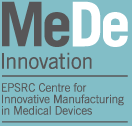Innovation Challenges & Research
The Centre for Innovative Manufacturing in Medical Devices has been formed to support the medical devices sector in addressing some of its major challenges. This rapidly growing sector is experiencing strong demand for innovation in manufacturing processes, evolving environmental and regulatory requirements and calls for greater personalisation and increased reliability of medical devices.
Through our research focus on the development of advanced methods of functionally stratified design and near-patient manufacture, we aim to deliver cost-effective processes to ensure that patients receive the right product – featuring an enhanced standard of reliability and performance – at the right time.
Flagship innovation challenges
Our Centre focuses on two flagship innovation challenges, split into smaller projects which address some of the key challenges facing medical device manufacturers and healthcare providers.
Innovation challenge 1:
Stratified design & manufacture
Across all markets there is a demand for increased reliability and assurance of throughout lifetime performance of medical devices. Enhanced pre-clinical simulation and fuller evaluations of medical devices are necessary to meet the requirements of new developments in the regulatory framework for medical devices. These new developments include increasing stringency in regulation and the global harmonisation for regulatory approval, both of which increase the cost of compliance for manufacturing companies.
In the developed world and tier one markets, patients are demanding earlier intervention and tissue preservation, which requires enhanced diagnostics and increased levels of personalisation. New approaches to design and manufacturing and new materials technologies are needed to deliver this within the existing cost envelope; supported by less invasive surgery and shorter hospital stays.
Our research, which is split into four distinct projects, will address increased functional stratification to produce more robust design, manufacture and deployment processes to accommodate variations in patients, populations and surgery.
Project 1A: Functionally stratified design & manufacture of hip & knee implants (opens PDF)
Project 1B: Stratified bioprocesses for the manufacture of acellular scaffolds (opens PDF)
Project 1C: Stratified design & manufacture of nonwoven collagen scaffolds (opens PDF)
Project 1D: Manufacture of fully bioresorbable multiphase fixation devices to order (opens PDF)
Innovation challenge 2:
Manufacturing at the point of need
Manufacturing at the point of need is central to developing processes which are (where possible) minimally invasive and that can effectively deliver bioactive materials. One of the major drivers for novel surgical interventions is to decrease the anatomical injury at surgery, reduce patient time in patients and accelerate the rate of recovery .
The last decade has seen significant growth in research into biofabrication and many approaches have been developed. However many of these suffer from limitations, in particular in relation to structural materials being too soft to provide significant support in clinical applications.
This research theme will address defects in the musculoskeletal system as early as possible, through the development of more robust structural bioactive materials, such as bioactive glass-ceramics and biopolymers. It will also examine the potential for enhancement of devices using biomolecules and the optimisation of devices to enable them to interact with cells added at the site of implantation or those that have been therapeutically added.
Project 2A: Minimally invasive implantation of bioactive materials (opens PDF)
Project 2B: Processes for in-clinic manufacture (opens PDF)
Fresh Ideas Fund: Feasibility studies
MeDe Innovation is widening the national reach of its research by awarding feasibility study funding to shape the future direction of the Centre.
Eight of the UKs leading scientists, engineers and clinicians have been granted awards of £50k to identify the key challenges and questions that are not currently being addressed in orthopaedic medical device design and manufacture research.
The funds will allow investigators to develop the evidence and refine the research questions that will allow the development of full proposals for funding that can be submitted to existing national and global funding schemes.
A panel of leaders from industry and academia selected the winners from nominations put forward by over 20 universities and companies. The winners showed an exemplary fit with the research challenges being led by the Centre, offered significant potential and had support from industry:
3D printing of Lumbar Fusion Cage based POSS-Nanocomposite Biomaterial – Prof Alexander M. Seifalian & Dr Deepak M. Kalaskar, UCL Centre for Nanotechnology & Regenerative Medicine, Division of Surgery and Interventional Science, University College London.
Advanced Manufacture of Thermo-Sensitive Medical Devices for Targeted Regeneration of Endochondral Bone at the Bone-Tissue interface -Dr Nicholas Dunne & Dr Helen McCarthy, Queen’s University Belfast
Preliminary Study of Expandable Osteochondral Scaffolds in Achieving Mechanical Stability and Biological Fixation for Large Osteochondral Defect Repairs -Dr Chaozong Liu, Prof Gordon Blunn, Mr Andrew Goldberg, Institute of Orthopaedic & Musculoskeletal Science, University College London
